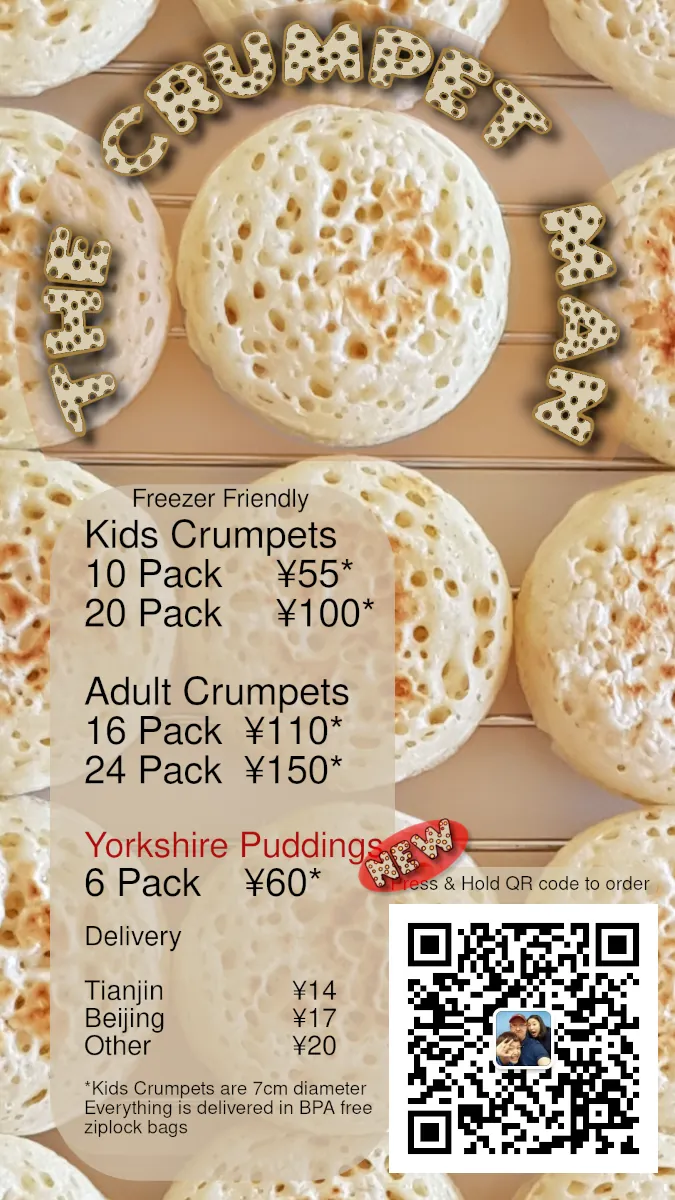The Crumpet Man: Crumbs of Mental Health
What we did
Industry
Tech
Description
There’s something almost magical about the way a crumpet sizzles and springs to life on a hot griddle. The golden exterior and honeycombed interior, just waiting to soak up melted butter and a drizzle of honey, are enough to conjure memories of simpler, more comforting times. During the long, uncertain months of pandemic lockdowns in Tianjin, this small piece of nostalgia became my unexpected way of making a difference.
Like so many of us, I remember those early days of the COVID pandemic vividly. The streets of Tianjin, usually bustling with the laughter of street vendors and the steady hum of commuters, fell silent. The city’s lively rhythm was muffled, replaced by the droning wail of police megaphones waking us before sunrise for mandatory COVID testing. At 5 a.m., like clockwork, we would rise from our beds, sleep-heavy and bleary-eyed, like a sea of zombies stumbling into the chilly morning air. It was a surreal world—one where fear mingled with fatigue, and isolation threatened to erode even the most resilient spirits.
It was during one of these bleary-eyed testing mornings that an idea sparked. Locked down in my apartment, as restless as everyone else, I had taken to baking as a way to cope, to keep myself busy, and to reclaim some small sense of control in a world turned upside down. One day, I flipped through a battered old cookbook I had brought with me from the UK and landed on a recipe for crumpets. The sight of it—those familiar, pillowy rounds—brought back memories of cozy breakfasts and laughter with loved ones, a taste of home that I hadn’t realized I needed so desperately until that very moment.
And then it hit me: crumpets could be more than just a personal comfort. Maybe they could be a source of solace for others, too. After all, Tianjin was home to a sizable community of expats from all corners of the globe, including many Brits like me, all missing the familiar tastes and rituals of home. What if, in this sea of anxiety and isolation, a simple crumpet could offer a small sense of normality?
So, I started a crumpet business right out of my tiny kitchen. I tested and perfected the recipe, experimenting with ratios and griddle heat until each crumpet emerged golden, full of those perfect little air pockets. Then, armed with nothing but flour, yeast, and an old metal mixing bowl, I began spreading the word. I posted in WeChat groups, sent messages to friends of friends, and offered the promise of homemade crumpets to anyone in need of a little cheer.
The response was overwhelming. Almost overnight, my makeshift crumpet operation was inundated with orders. The sheer volume was both exhilarating and humbling. People from all over Tianjin, and soon all over China, were reaching out—not just to place orders but to share their stories. Brits long stranded far from home sent me heartfelt messages, writing how a simple crumpet reminded them of breakfast in their mum’s kitchen or lazy Sunday brunches at their favorite café back in Manchester or London. But it wasn’t just the British expats. Australians, Canadians, and even local Chinese residents, curious and adventurous, lined up to try this foreign delicacy that seemed to radiate warmth and comfort.
With my apartment transformed into a bustling bakery, I packaged each order in humble brown paper bags, lovingly stamped with a handmade logo. I sent out crumpets by the dozen to cities across China, using courier services that miraculously kept functioning amid the chaos of lockdowns. People posted rave reviews on social media, sharing photos of crumpets slathered in butter, topped with marmalade or jam, and even dripping with maple syrup. It was a delight, a connection, a reminder that even in the darkest of times, something as small and simple as a warm, buttery crumpet could spread a bit of light.
Looking back, the crumpet business was a perfect example of turning hardship into hope. Yes, the pandemic was grim, and our mental health collectively suffered under the weight of relentless testing, government restrictions, and the eerie quiet that had overtaken our once-bustling neighborhoods. But there was also a beauty in how people found ways to lift each other up. My crumpets became more than a food item; they became a way to reach out and comfort strangers, a symbol of resilience and resourcefulness.
We were all locked down, sure. But we were also connected, united in our craving for familiarity and our desire to feel even the smallest taste of home. I may not have been a frontline worker or a scientific genius creating vaccines, but I’d like to think that, in my own flour-dusted way, I helped. I made a bad situation better. I lifted spirits one crumpet at a time, sharing not just food but a small reminder of home, hope, and humanity.
Even now, as the world slowly rebuilds, I sometimes think about those mornings spent flipping crumpets in my Tianjin kitchen, about the friends I made along the way, and the community we built through something so simple and universal as the joy of breaking bread—or, in this case, breaking crumpets.





